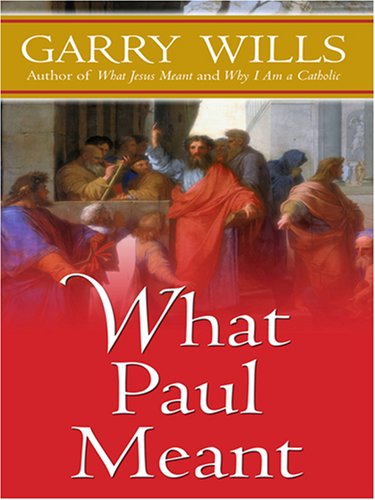Items related to What Paul Meant (Thorndike Press Large Print Inspirational...

"synopsis" may belong to another edition of this title.
Garry Wills, Pulitzer Prize-winning author of Lincoln at Gettysburg, studied for the priesthood, took his doctorate in the classics, and taught Greek for many years at Johns Hopkins University. He has written many acclaimed works on religion, including two New York Times bestsellers. Wills is professor emeritus of history at Northwestern University.
The aversion is widely shared. Many Christians believe that rather than spreading the message of Jesus to the world, he betrayed it. Most Jews harbor a distinct dislike for this teacher of Torah who converted to Christianity. Besides, isn't he the original source of Christian anti-Semitism? Didn't he condemn Jewish law, exalt faith over works, and crisscross the Roman Empire urging synagogue congregations to accept Jesus as the Messiah? Didn't this prissy arch-patriarch warn women not to speak in churches, to cover their heads when they pray and to be submissive to their husbands? Isn't he also the font of Christian homophobia? All in all, the man some people call the true founder of Christianity does not seem to have many friends out there today.
But, says Garry Wills in his new and lucid book, all these depreciators are just plain wrong. Paul was neither an anti-Semite nor a misogynist. In fact, he never converted to Christianity at all, which did not yet exist when he had his blinding experience on the Damascus road. What happened to him on the road was not a religious conversion. It was a call, similar to those received by the Hebrew prophets Isaiah and Jeremiah before him. As for women, the verses that put uppity sisters in their place are found not in Paul's writings but in those falsely attributed to him. Paul himself frequently commends women leaders in the congregations and proclaims that in these new messianic congregations there should be "neither male nor female, neither slave nor free."
What happened on the Damascus road was that God charged Paul with a message and a mission: Go tell Jews everywhere that the messianic era they had prayed for had dawned and that a certain rabbi from Nazareth, slain by the Romans as a threat to their empire and raised from the dead by God, was the long-anticipated Messiah. Therefore, Paul insisted, the hour had now come -- as the prophets had foretold -- to welcome the gentiles into the covenant community previously restricted to the seed of Abraham.
Not everyone believed Paul's message, of course, but enough -- both Jews and gentiles -- did to constitute a new movement within an already diverse Jewish community. Paul had no intention of starting a new religion. The only Bible he knew (and he knew it well) was the Jewish Scriptures. Wills believes that if Paul could have foreseen that his occasional letters to the small congregations he had launched in Corinth, Ephesus and other imperial cities would one day be collected in something called the "New Testament," and that the only scripture he knew would be called "old," he would have vociferously objected.
Still, one old and vexing question remains: Why did a tiny Jewish sect, born in Palestine, spread with such uncanny rapidity through the Roman world? Wills suggests simply that the time was ripe for just such a message. With the Roman pantheon in decay -- dismissed by thoughtful people as mere superstition -- and with Roman society rife with moral putrescence, the Jews' strict monotheism and stern morality held a powerful attraction. Large numbers of gentiles were already attending synagogues but hesitated to undergo the circumcision and dietary restrictions required for conversion. At the same time, many Jews were looking for a more universal expression of their faith, in keeping with the emerging cosmopolitan culture. Paul's message attracted both. He taught that God had given his law to both Jews and gentiles, the former in the Torah, the latter by nature. All had fallen short, but now all were forgiven and called to constitute a single new and inclusive community in which there was "neither Jew nor Greek."
Wills is not a biblical scholar, but he is a voracious reader and an eloquent writer who makes judicious use of the best recent scholarship. So it is odd that he ignores the most exciting new direction in Pauline research, which suggests that the Roman Empire was not just the background of Paul's life and work but shaped his every word and deed. The empire was shaky, and Paul discerned its inner rot. He saw his task as preparing infrastructure that would replace it when it collapsed. Thus he gave the congregations he organized a political, not a religious name: "ecclesia," meaning an official assembly of citizens. When these upstarts insisted that there was someone higher than Caesar to whom they owed supreme loyalty, Roman officials saw that they threatened the symbolic capstone of the whole system. The empire executed Peter and Paul, and Jesus before them, because the imperial elites did not view their movement as a harmless, otherworldly cult but as a real and present danger.
Paul has gotten a bad rap. He took the first big step in transforming a universal message, stifled by a provincial culture, into a world-circling faith. It is time to free him from the misconceptions that have distorted his significance.
Reviewed by Harvey Cox
Copyright 2006, The Washington Post. All Rights Reserved.
"About this title" may belong to another edition of this title.
- PublisherThorndike Pr
- Publication date2007
- ISBN 10 0786290099
- ISBN 13 9780786290093
- BindingHardcover
- Number of pages245
- Rating
Buy New
Learn more about this copy
Shipping:
US$ 4.50
Within U.S.A.
Top Search Results from the AbeBooks Marketplace
What Paul Meant (Thorndike Press Large Print Inspirational Series)
Book Description Hardcover. Condition: New. New, unread hardback w/ jacket; crisp, clean, tight. Seller Inventory # XH-0CYW-NL94

